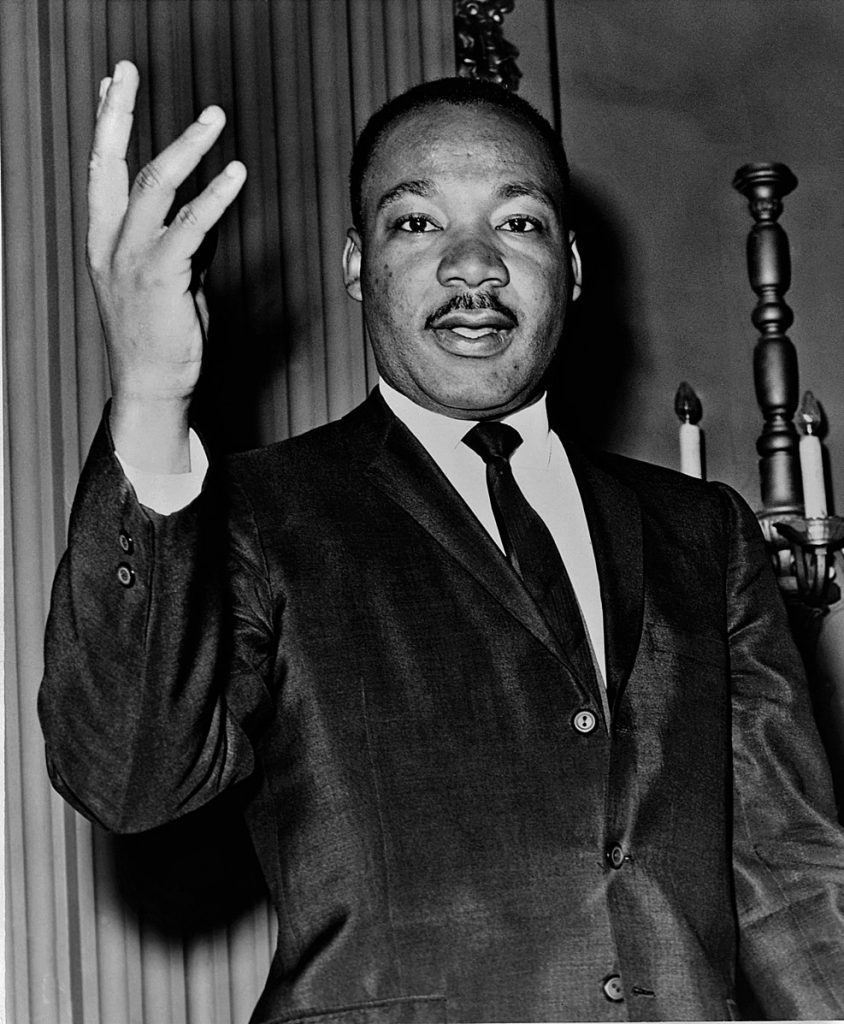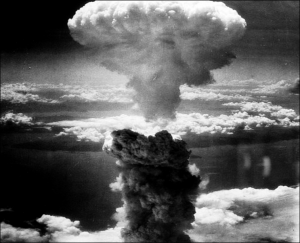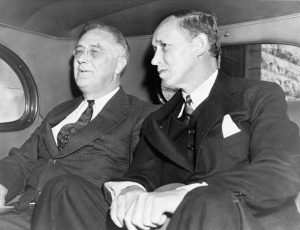When news broke that civil rights leader Martin Luther King Jr. had been killed on April 4, 1968 in Memphis, Tennessee, people couldn’t help but feel anger and outrage. King, who had started a revolution to end social injustice, had just been killed, and many people were left wondering if they would forever be stuck in a never-changing world.1

When black citizens in Washington D.C found out King had been killed, they wanted local stores to close out of respect for this civil rights leader. When stores did not close, this lack of respect sparked a dispute between citizens and the police. What started off as a peaceful mourning ended up a four-day violent riot where people were smashing windows, breaking into stores and hurting each other. Store owners wrote “Soul Brother” on their windows to let rioters know they were black-owned and also mourned King’s death. Because Dr. King didn’t believe violence was the answer, it’s ironic that rioters used violence to show their anger about his assassination.2
The rioters seemed ready for war and had no plans on stopping, which caused 13,600 troops, along with the National Guard, to try to end the riots. They gave the citizens a curfew and stopped selling alcohol and guns in hopes they would give up on rioting. Although the mayor instructed them not to fire at anyone, troops shot two people and injured many more. In total there was 12 deaths and 1,098 injuries in Washington D.C alone. Throughout the nation, cities such as Chicago, Kansas City, and Baltimore were having their own riots related to the assassination, and the nation accumulated more than 2,500 injuries and 40 deaths. Each city seemed handle the riots in similar ways, but Washington had the most damage and the hardest time getting back to normal after the riots.3
Police continued monitoring the streets, and on April 8, 1968, the city seemed to be done with the riots. The city of Washington D.C started rebuilding after accumulating $25 million in damages during the riot. Some areas were fixed right away, while other areas such as Seventh Street and Florida Avenue NW took more than thirty years to return to normal. Due to this rebuilding process, the economy tanked, causing “white flight,” where many white residents moved away from Washington D.C because of the violence occurring in the neighborhoods.4

The riots may have ended, but people across the nation were still hurting and angry. On April 11, 1968 Lyndon B. Johnson signed the Civil Rights Act Of 1968, which prohibited discrimination concerning the sale, rental and financing of housing based on race, religion, national origin or gender. Many believe that President Johnson signed this act in attempt to prevent any more riots and outbreaks that may have occurred in the nation. Although signing this act didn’t cure racism and didn’t heal the broken hearts of the many people mourning, it was a step in the right direction and the last major act of the Civil Rights Movement.5
- Adrienne Wilmoth Lerner, Brenda Wilmoth Lerner, and K. Lee Lerner, City of Memphis v. Martin Luther King Jr. (Detroit: Gale, 2006), 345-348. ↵
- Meggin Condino, Martin Luther King Jr.’s Assassination Shocks the Nation (The Arts, Business and Industry: UXL, 2010), 42-44. ↵
- Meggin Condino, Martin Luther King Jr.’s Assassination Shocks the Nation (The Arts, Business and Industry: UXL, 2010), 42-44. ↵
- Encyclopedia of Social Problems, 2008, s.v. “White Flight.” ↵
- Encyclopedia of African American History, 2010, s.v. “Civil Rights Act of 1968.” ↵



51 comments
Aaron Sandoval
This article was well written and covered the aftermath of the association of one of the greatest men in history. When learning history we rarely cover the reality of the aftermath of MLK’s assassination, at most we are taught of his funeral and how America moved forward. But we are rarely taught of what really happened and the pain that Americans felt at the time. This article did a good job of presenting the information relating to the riots and actions taken by the government and President LBJ to prevent further riots.
Todd Brauckmiller Jr.
Such a shame every time I read this story, a man doing what was right and was rewarded with a horrible outcome. The civil rights era is one of my most favorite subjects in all of history. The push for equality was a hard struggle but it got the job done and look at how far we have come as a society. Now the world today isn’t exactly one hundred percent perfect but it is better then what it used to be, in certain categories that is. What’s important is how we handle those harsh moments and find solutions to them.
Olivia Tijerina
It was quite interesting to know the events that took place after the assassination of Dr. Martin Luther King Jr. The message that pointed out that all that had happened came into a reverse towards what Dr. King had valued and stood for , to do all things peacefully. Moreover, bringing the Civil Rights era to an end in 1968 Lyndon B. Johnson signed the signs the civil rights act. And was possibly done so to attempt to lower the amount of rage after the assassination.
Addie Piatz
Reading about Martin Luther King Jr. always makes me happy because it shows how moving a belief can be. Hearing about his death however makes me realize that even though we’re allowed to have these beliefs we pay the price for acting on them. As sad as it is that King had to die for what he believed in, without him I can’t imagine where we’d be today. Finding someone with the courage that he had feels almost impossible.
Rebeca Escobar
The riots remind me strongly of the riots that took place following the deaths of Alton Sterling, Sandra Bland, Tamir Rice, and many more. It seems most of the time, that the face of racism has never ceased to exist. I can’t imagine how people felt following the assassination of Martin Luther King Jr.; he was an extraordinary leader and the face of the civil rights movement.
Uzziyah Cohen
The death of any human being is sad; however, the assassination of Rev. Dr. Martin Luther King was tragic. I feel a connection to Dr. Martin Luther King on several levels first as a member of Alpha Phi Alpha Inc., and second as a Freemason. This article passionately details the results of the assassination of Martin King Jr., And how the riders ironically used violence to protest disrespect towards civil rights leader that embody nonviolence. Additionally, this piece exhibited how government can have a positive impact and challenging or violent situations. Although this may have been the end of the civil rights era, it was the beginning of social equality in America.
Nawaf Almarwaie
the KING, done great job to the whole nation by trying to convince the decision makers and law makers to give black people their rights, and to end the segregation, i can imagine how people were felling when they first heard about the assassination, how the thought that their dreams of equality gone away, not only that but also they did not know if this inequality situation will least forever or there is another king will come out and ask for people rights. certainly that that night was one of the saddest day for the whole nation
Alicia Guzman
The author sets this article up well because I try to imagine what I would be like finding out about the assassination of an American civil rights icon and hero. It is no wonder that the man who have given so many communities hope about equality were upset. It seems that this may have been the straw that broke the camel’s back. In a way it is a little sad since violence was the opposite of King’s doctrine. May he rest in peace.
Sharriah Martinez
This article was very well written and explained the riots that went on for four days after Martin Luther King’s Death. MLK advocated for peace, he never believed that was and violence would solve disagreements. When he was assassinated people then broke out into a rage when they discovered restaurants and businesses were not closing out of respect for this man. The riots got so our of hand twelve people died, and over a thousand were injured. I knew of MLK’s death, the sadness and anger that erupted but not the riots and deaths. Thank you for the great article.
Mariah Cavanaugh
I can only imagine what it must have felt like to learn that the man who advocated for peace was gunned down. They reacted much the same way the residents of Ferguson, Missouri did after the shooting of Michael Brown, with violence. Anger and frustration can only be ignored for so long before it bubbles to the surface and erupts. Your article made for a great read!